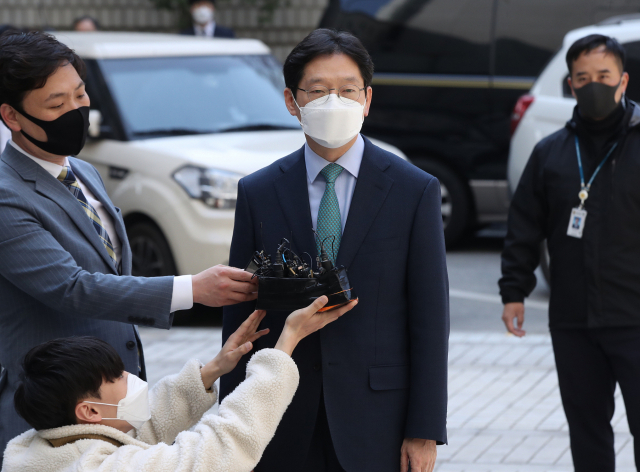South Korea’s Supreme Court sentenced South Gyeongsang Governor Kim Kyoung-soo to two years in prison for manipulating online public opinion to help President Moon Jae-in win the 2017 presidential election. The scandal, which first emerged in 2018, has raised serious questions about the legitimacy of the Moon administration.
On July 21, the Supreme Court upheld a high court ruling that Kim, who was a longtime ally of Moon, was guilty of taking part in a major opinion-rigging operation to help Moon win the election. The Seoul Central District Court convicted him in January 2019 and the Seoul High Court upheld the conviction in November 2020.
In South Korea, elected officials automatically lose their seats if they are sentenced to prison. Kim served 77 days in prison after the lower court found him guilty. The court released him on bail to allow him to serve as governor, and he went through the appeals process without detention. Kim will now serve the rest of his prison term, or two years minus 77 days. The prosecution started the process of sending him to jail, and it will take three to four days for Kim to start serving his sentence. Kim, who was considered as one of the most prominent potential successors of President Moon, will be prohibited from running in an election for the next seven years.
In 2018, Kim was indicted on charges of colluding with political blogger Kim Dong-won, better known by the alias Druking, to mount an online campaign beginning in November 2016 to support Moon’s 2017 presidential campaign. The blogger and his associates used a computer program to post and manipulate thousands of positive comments about Moon on social media. The blogger was convicted of online opinion rigging and sentenced to a three-year prison term by the Supreme Court in February 2020.
The Supreme Court, however, upheld the high court’s acquittal of Kim over an election law violation. Prosecutors argued that Kim violated the election law by promising the blogger a diplomatic post in Japan after the presidential election in return for his illicit work. Kim was found guilty of the charge in 2019 and sentenced to 10 months in prison, but the high court in 2020 overturned the conviction.
Kim continued to insist on his innocence. “I will not give up the belief that truth will eventually return to its place,” he said shortly after the final verdict. “Unfortunately, there is no further way to find the truth in a courtroom. According to the Supreme Court’s decision, I will take my responsibility.”
The presidential Blue House remained silent. A senior official said, “There will be no official statement from the Blue House.”
Special Prosecutor Heo Ik-beom, who investigated and indicted Kim, expressed satisfaction with the decision. “The court handed down a punishment on a politician for having influenced an election by manipulating online opinion through a private organization,” Heo said. “This is a warning to politicians that elections must be fair.”
The final verdict by the Supreme Court on Moon’s key ally is another ominous sign for presidential contenders from the ruling Democratic Party (DP). They largely said they were disappointed by the ruling.
“Even though the question of the authenticity of Kim Dong-won, or Druking, was raised, the Supreme Court came up with such a verdict,” said Ko Yong-jin, the spokesman of the DP. “We share feelings that it is hard to accept.”
The main opposition People Power Party (PPP) demanded an apology from President Moon. “Today’s ruling will be a critical blow to the legitimacy of Moon’s presidency,” said Rep. Hwangbo Seung-hee, spokeswoman for the PPP. “We want a sincere apology.”
Rep. Hong Joon-pyo of the PPP, who ran against Moon in the 2017 presidential election, asked, “Doesn’t Moon have to at least apologize to me or to the other presidential candidate Ahn Cheol-soo, who were the biggest victims of this public opinion manipulation?” He added that Gov. Kim served as a key aide to Moon during the presidential election, and that they need to find an accomplice at a higher level.
“The judiciary confirmed that the current administration has a serious flaw to its legitimacy,” Yoon Seok-youl, former prosecutor general under the Moon administration and key opposition presidential hopeful, said in a statement released through his spokesman. “There is various ongoing public opinion manipulation ahead of the next presidential election, and I do not think that the people will allow this distortion of public opinion to happen.”
Choe Jae-hyeong, former head of the Board of Audit and Inspection and a presidential hopeful from the PPP, stated that online public opinion manipulation is the biggest threat facing liberal democracy.
Meanwhile, Cho Hai-ju, standing commissioner of the National Election Commission, resigned abruptly from his post even though his term ends in January. The media speculated that Cho made the surprise decision to influence next year’s election. The standing commissioner has a lot of authority over appointing NEC officials. Normally, the NEC’s reshuffle process is conducted in December. NEC sources told the media that the standing commissioner who will leave in January would have a hard time exercising influence over the process, which is why they are trying to replace the standing commissioner ahead of the reshuffle process. The new standing commissioner will have a three-year term and will be appointed by Moon.
Cho was named a special aide to the DP’s 2017 presidential election campaign, and the PPP opposed President Moon appointing him as the standing commissioner in 2018. Nevertheless, President Moon appointed Cho even though the National Assembly failed to hold a hearing due to a PPP boycott.


